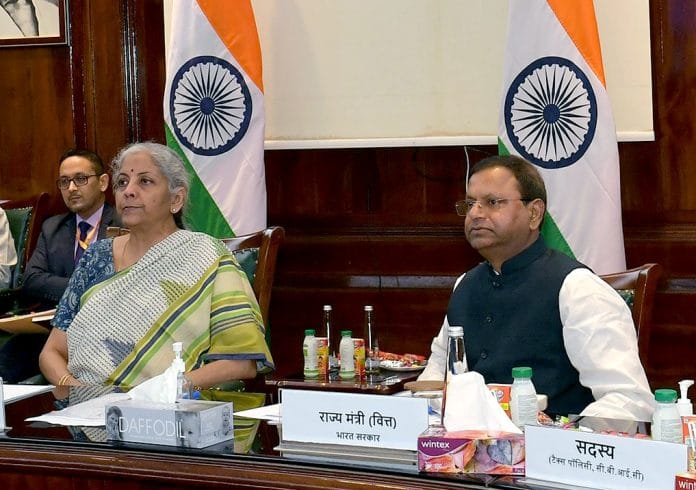New Delhi: The 28 percent Goods and Services Tax (GST) leviable on online gaming, gambling, and horse-racing will be imposed on the initial buy-in, not on winnings, Union Finance Minister Nirmala Sitharaman clarified Wednesday.
Sitharaman, who was speaking after the 51st GST Council meeting, said all attempts would be made at the central and state levels to pass the required legislation in Parliament and state assemblies so that the new rates can be implemented from 1 October.
The decision comes less than a month after the council’s upward revision of the tax caused significant consternation among industry players, who felt the rate was too high and would hurt the industry.
Wednesday’s meeting was held via videoconferencing to discuss the decisions taken regarding tax on online gaming, gambling, and horse racing during its previous meeting on 11 July. At the time, Sitharaman had announced that the 28 percent rate would be applicable on the “face value”.
The development comes after the online gaming and gambling industry voiced their concerns about whether the 28 percent GST would be applicable not only to the initial buy-in but also winnings, thus leading to double taxation.
States too expressed their concerns at Wednesday’s meeting.
Also Read: Six years of GST — robust revenues but reforms key to easing compliance & boosting states’ incomes
States’ concerns
According to Sitharaman, states such as Goa, Sikkim, Delhi and Tamil Nadu voiced their concerns about the policy.
While Goa’s and Sikkim’s issues lay with the high rate of taxation on gambling, Tamil Nadu sought more clarity on whether this would undermine or overrule the state government’s own ban on online gaming, the finance minister said.
Delhi, meanwhile, wanted a fresh review of the rules on online games.
According to Sitharaman, Delhi Finance Minister Atishi called for the entire issue to be reviewed again and sent back to the Group of Ministers that had made the recommendations on the basis of which the GST Council took its decision in July.
This, she went on to say at the press conference, was the second time in the history of the GST Council that a consensus had not been reached — the only other time when that happened was when the GST had to decide on lotteries in December 2019 during its 38th meeting.
“While the Council’s legacy has been on a positive, consensus-based decision-making, there are times, once earlier and now, where the decision is not consensus based,” Sitharaman said.
She added: “The decision to amend the CGST Act had these dissenting voices… Delhi on online games, Goa and Sikkim on casinos, and Tamil Nadu on their online games having been banned, and how will these changes affect that.”
Industry concerns
A major concern the online gaming and gambling industry had was whether the 28 percent would be applicable on the winnings as well. This, they said, would lead to double taxation, where tax would be levied on the initial buy-in and then subsequently each time winnings were used in bets.
In its press release after the meeting, the Union Ministry of Finance said that additional winnings after the initial buy-in will not be taxed.
“The Council also recommended that valuation of supply of online gaming and actionable claims in casinos may be done based on the amount paid or payable to or deposited with the supplier, by or on behalf of the player (excluding the amount entered into games/ bets out of winnings of previous games/ bets) and not on the total value of each bet placed,” the Ministry of Finance said in a press release.
In other words, suppose a person buys gambling tokens worth Rs 1,000, wins Rs 300, and puts those winnings back into the game. The tax will be only on the Rs 1,000 buy-in and not the Rs 300 additional winnings.
Despite the government’s clarification, however, industry bodies remained concerned. In a joint statement they issued, the Federation of Indian Fantasy Sports (FIFS) and E-Gaming Federation (EGF) said that the tax could still set back the industry by several years.
While FIFS is India’s only fantasy sports industry body, EGF is an independent not-for-profit organisation that works on regulating the online gaming industry in India.
“FIFS & EGF, which represent 50 Indian online gaming companies, appreciate the government addressing the industry’s concerns on the issue of repeat taxation,” the statement said. “The new tax framework, while clarifying and resolving uncertainty, will lead to a very burdensome 350 per cent increase in GST and set the Indian online gaming industry back several years.”
The bodies, however, also conceded that the decision “will allow gaming companies a fighting chance to innovate and rebuild the foundation of gaming in India”.
(Edited by Uttara Ramaswamy)
Also Read: All about Modi govt’s new draft rules for online gaming — KYC to skirting ‘skill vs chance’ debate






